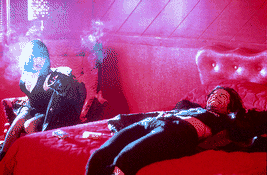 The
Doom Generation: Young, Beautiful And Fucked Up
The
Doom Generation: Young, Beautiful And Fucked Up The
Doom Generation: Young, Beautiful And Fucked Up
The
Doom Generation: Young, Beautiful And Fucked UpIn my college film class one night, our teacher of 32 years' experience posed a question to us after a screening of David Lynch's Blue Velvet. "All right, you've seen the film," Dr. Tom Reck said. "You've seen the imagery, you've seen what Lynch was trying to do. Here it is: is David Lynch an idiot or a genius?"
We never answered that question, but I found myself asking it again after watching Gregg Araki's The Doom Generation (unrated). There's two possible ways to look at this movie: one is as a slickly-packaged upscale commercial product for dopey angst-ridden burnouts who have nothing better to do than listen to Nine Inch Nails all day. The other is that it's really a satire, even down to some of the cheesy-as-hell dialogue that is exchanged between Jordan White (James Duval) and Amy Blue (Rose McGowan) when they try to open up to each other.
If you accept the first explanation, he's an idiot. The second, a genius.
I'm just not sure. But Araki poses the question successfully and makes you think about his movie long after it's over, so he must be doing something right. Ten minutes after watching the enjoyable Grosse Point Blank, I found myself trying to remember any of the dialogue that I had enjoyed. At least Doom sticks in your head.
Critically The Doom Generation was attacked by critics for coming out on the wave of "psycho road movies" that suddenly seemed to be everywhere. It was compared to everything from Natural Born Killers, 90210 to Love and A 45. Redux (okay, I lied about that one, but it fits). But if this movie had come out in 1991 instead of 1995, I'm sure it would have been one of the most talked-about films of the year. It's just impossible to ignore.
The Doom Generation follows Amy, Jordan and Xavier Red (Johnathon
Schaech) during a period of about forty-eight 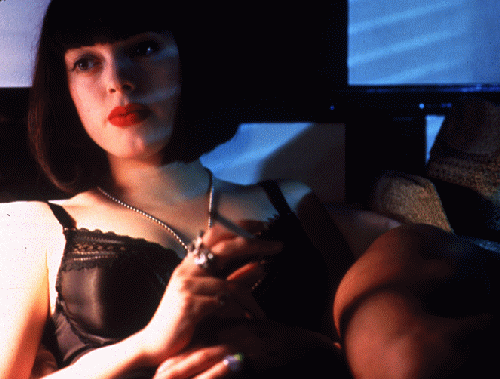 hours
as they cruise Southern California, stopping to fornicate and kill along
the way. You may think that there's more to the plot, but that's really
about the extent of it... unless you buy Araki's argument that it is really
"about finding love and discovering joy in themselves" during the course
of their journey.
hours
as they cruise Southern California, stopping to fornicate and kill along
the way. You may think that there's more to the plot, but that's really
about the extent of it... unless you buy Araki's argument that it is really
"about finding love and discovering joy in themselves" during the course
of their journey.
A journey composed entirely of fornication and shotgunnings, perhaps? Hmmm... yet this could be possible, and ironically enough it's a scene near the end which proves it. The center of action in the film is Amy, the catalyst for everything around her. She's the one who is driving the car. She's the one deflowering Jordan (and being similarly deflowered herself). She's the one who makes even Xavier pause. Bust most of all, it's the dingbats who keep mistaking her for one of their exes. And on the day that one of them will be dead, it's her who is smiling and joking. She makes the change and has it smacked out of her in the final scene. We'll get to that later. But there's weight to this argument, and Araki successfully dodges the classification again.
Is there violence in this movie? You bet there is. Graphic? How does
21 Jumpstreet's Dustin Nguyen having his head blown off into the
relish sound to you? And then he begins to spout the stuff rom his mouth
like a demented Pez dispenser while shrieking curses at his executor, Xavier.
SuBurbia alumni Nicky Katt is working at a neon nightmare place
called 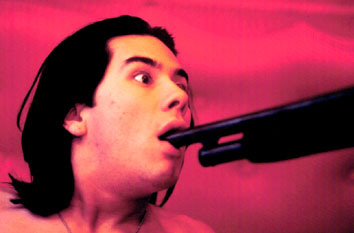 Carnoburgers
when Amy cruises through his drive-through. It's his ex-girlfriend, the
love of his life... and she's leaving. That won't do. He marches to their
hotel, sticks a shotgun in Jordan's mouth and waits for his beloved. Like
the rest who cross their paths, he meets his demise courtesy of Xavier.
But before he buys the farm, he stumbles against the side of their car
with his arm severed, dribbling blood on the window. It's like the old
dead baby jokes- you laugh at something like this because the alternative
is to sit there in shock.
Carnoburgers
when Amy cruises through his drive-through. It's his ex-girlfriend, the
love of his life... and she's leaving. That won't do. He marches to their
hotel, sticks a shotgun in Jordan's mouth and waits for his beloved. Like
the rest who cross their paths, he meets his demise courtesy of Xavier.
But before he buys the farm, he stumbles against the side of their car
with his arm severed, dribbling blood on the window. It's like the old
dead baby jokes- you laugh at something like this because the alternative
is to sit there in shock.
The other thing and likely the one which provoked the most debate (and walk-outs on the movie) is the movie's first thirty minutes that coupled with truly horrible writing and performances. The first scene of Rose McGowan and James Duval at a club called Hell was one of the most painful things I've seen since the WWII footage of Welcome To The Camps. McGowan's crystal meth-addled character is not only the most foulmouthed wench on the screen in a long time, she's the worst with her choice of insults. If you're lying, you're "full of sheep excrement," a line that's been laughed to death a thousand times. She swears, smokes and screams in equal amounts. I've had girlfriends like her, granted, but I dumped them quick.
The other note was Duval. With his zombified surfer-Zen outlook and passive puppydog presence, I was soon wincing every time it appeared he was going to open his mouth. I can honestly say I haven't hated a performance so much since Keanu Reeves in Feeling Minnesota, which only lasted twenty minutes on the VCR. Araki says he was chosen because he was "the perfect lamb to the slaughter." On this note, his casting scored a big fat 100%: when his number comes up at the grisly end I found myself (and the others watching) cheering. And this was a scene that watched mostly through my fingers, mind you. Me, the veteran of Hellraiser...
Now that I've counted the sins of the movies, let's count the positives. Believe it or not, they're almost equal which is what makes this movie so maddening. Johnathon Schaech is excellent in his role of Xavier, and he's almost believable. I'm not sure if this is reflection of Araki's writing or his performance, but whatever it is, it works. While baiting Amy in the car you're laughing as he deflects each of her tough-girl comments smoothly by asking about her panties, seeing if Jordan will follow him like a puppy dog (he does) and other gratingly irritating things that he somehow manages to make work.
Remember how I said I hated the first half hour of the movie? The other
fifty-three minutes make up for it. For some 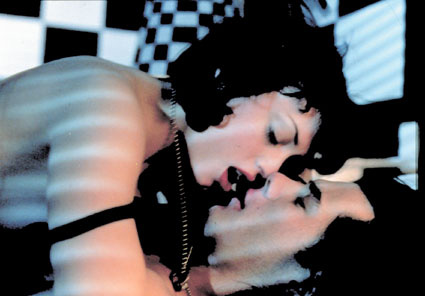 reason,
I started caring whether or not these dingbats got out of there alive.
I wanted Amy to wake up and smell the coffee, and she did. I was pleased.
Jordan was really annoying me and I'd wished that he would die... and he
gets castrated and killed and the movie's over. Considering how much I
disliked him, I considered it a case of all's well that ends well... sort
of.
reason,
I started caring whether or not these dingbats got out of there alive.
I wanted Amy to wake up and smell the coffee, and she did. I was pleased.
Jordan was really annoying me and I'd wished that he would die... and he
gets castrated and killed and the movie's over. Considering how much I
disliked him, I considered it a case of all's well that ends well... sort
of.
Another reason for discussion is it's ambiguous sexuality thrown in. (the openly gay Araki subtitled it "A Heterosexual Movie By GREGG ARAKI") Doom goes into areas of exploration on screen that most people got extremely squeamish about.
Occasionally described as a cult-like filmmaker, Araki gets his actors to do things on the screen that their parents would be shocked at and they do them unflinchingly. Xavier spies on Jordan and Amy in the bathtub and masturbates... then licks off his hand... well, you know what it was. The interesting thing about the scene is this: five seconds before it happens, you know what he's going to do. "Here comes the hand, here comes the tongue, there goes the- holy shit, I can't believe I watched that! Why didn't I turn away?" Araki is very, very good at showing things on the screen which ordinarily aren't... and then not letting his audience look away.
Part of this effect is attained by his cinematographer, John Fealy. The colors and definition in the movie (Araki's first with an over $30,000 budget) are so lushly vibrant that you feel you could almost fall into the screen. The color coded hotel rooms which the travelers stay in on their journey are surreal and beautiful, and it makes the sex scenes between Amy and Jordan and Amy and Xavier (missed that, didn't you?) have an added mystical edge. If the movie is really about self-awareness and growth through sexual awakening as Araki claims, it makes a convincing argument for this by Amy's simple willingness to smile in the morning at the sleeping Duval and Schaech. "What are you two homos doing?" she teases them, throwing pillows to wake them up. By George, the girl actually has teeth! And Lord, is she cute when she smiles...
So after all the scene listing and witty repartee, there's the final
question: is Gregg Araki an idiot or a genius? You know, I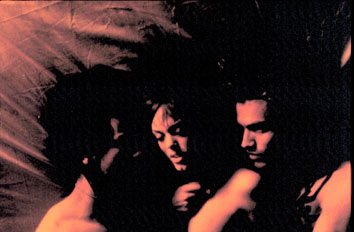 still don't know. Billed as the second installment in the "Teen Apocalypse
Trilogy" (a title I had to read four times to be sure it really said that),
The Doom Generation is about burning out at the end of the millennium
while looking for love. With running things like a) every purchase, no
matter what it is, will always cost $6.66; b) signs at every store and
roadhouse like "OBEY" and "The End Is Near" and c) recurring imagery of
skulls, industrial soundtrack and MTV-like camera operation, it's pretty
easy to laugh it all off as another wanna-be Gen X ripoff trying to cash
in on the "Extreme Filmmaking" genre. But with past credits like The
Living End (a competition piece for Best Drama at the 1992 Sundance
festival) and Totally F***ed Up (1994, James Duval offing himself
by drinking bleach was one of the scenes), it's not too hard to imagine
that Araki is dead serious about his work. Nowhere, the final chapter,
is out now.
still don't know. Billed as the second installment in the "Teen Apocalypse
Trilogy" (a title I had to read four times to be sure it really said that),
The Doom Generation is about burning out at the end of the millennium
while looking for love. With running things like a) every purchase, no
matter what it is, will always cost $6.66; b) signs at every store and
roadhouse like "OBEY" and "The End Is Near" and c) recurring imagery of
skulls, industrial soundtrack and MTV-like camera operation, it's pretty
easy to laugh it all off as another wanna-be Gen X ripoff trying to cash
in on the "Extreme Filmmaking" genre. But with past credits like The
Living End (a competition piece for Best Drama at the 1992 Sundance
festival) and Totally F***ed Up (1994, James Duval offing himself
by drinking bleach was one of the scenes), it's not too hard to imagine
that Araki is dead serious about his work. Nowhere, the final chapter,
is out now.
In itself, that's something worth talking about.